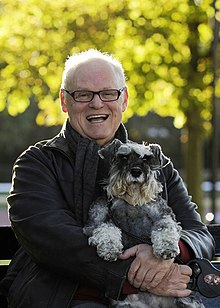Art rock is a subgenre of rock music that generally reflects a challenging or avant-garde approach to rock, or which makes use of modernist, experimental, or unconventional elements. Art rock aspires to elevate rock from entertainment to an artistic statement, opting for a more experimental and conceptual outlook on music. Influences may be drawn from genres such as experimental music, avant-garde music, classical music, and jazz.
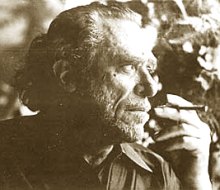
Henry Charles Bukowski was a German-American poet, novelist, and short story writer. His writing was influenced by the social, cultural, and economic ambience of his adopted home city of Los Angeles. Bukowski's work addresses the ordinary lives of poor Americans, the act of writing, alcohol, relationships with women, and the drudgery of work. The FBI kept a file on him as a result of his column Notes of a Dirty Old Man in the LA underground newspaper Open City.

In the arts and in literature, the term avant-garde identifies an experimental genre, or work of art, and the artist who created it; which usually is aesthetically innovative, whilst initially being ideologically unacceptable to the artistic establishment of the time. The military metaphor of an advance guard identifies the artists and writers whose innovations in style, form, and subject-matter challenge the artistic and aesthetic validity of the established forms of art and the literary traditions of their time; thus, the artists who created the anti-novel and Surrealism were ahead of their times.
Krautrock is a broad genre of experimental rock that developed in West Germany in the late 1960s and early 1970s. It originated among artists who blended elements of psychedelic rock, avant-garde composition, and electronic music, among other eclectic sources. Common elements included hypnotic rhythms, extended improvisation, musique concrète techniques, and early synthesizers, while the music generally moved away from the rhythm & blues roots and song structure found in traditional Anglo-American rock music. Prominent groups associated with the krautrock label included Neu!, Can, Faust, Tangerine Dream, Kraftwerk, Cluster, Ash Ra Tempel, Popol Vuh, Amon Düül II and Harmonia.
The Language poets are an avant-garde group or tendency in United States poetry that emerged in the late 1960s and early 1970s. The poets included: Bernadette Mayer, Leslie Scalapino, Stephen Rodefer, Bruce Andrews, Charles Bernstein, Ron Silliman, Barrett Watten, Lyn Hejinian, Tom Mandel, Bob Perelman, Rae Armantrout, Alan Davies, Carla Harryman, Clark Coolidge, Hannah Weiner, Susan Howe, James Sherry, and Tina Darragh.
William (Bill) Colvig was an electrician and amateur musician who was the partner for 33 years of composer Lou Harrison, whom he met in San Francisco in 1967. Colvig helped construct the American gamelan used in works such as the puppet opera Young Caeser [sic] (1971), La Koro Sutro (1972), and the Suite for Violin and American Gamelan (1974).

Harold Montgomory Budd was an American music composer and poet. Born in Los Angeles and raised in the Mojave Desert, he became a respected composer in the minimal music and avant-garde scene of Southern California in the late 1960s, and later became better known for his work with figures such as Brian Eno and Robin Guthrie. Budd developed what he called a "soft pedal" technique for playing piano, with use of slow playing and prominent sustain.
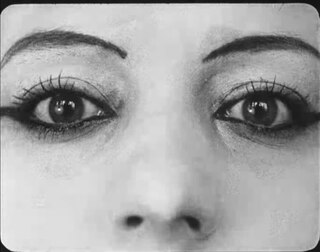
Experimental film or avant-garde cinema is a mode of filmmaking that rigorously re-evaluates cinematic conventions and explores non-narrative forms or alternatives to traditional narratives or methods of working. Many experimental films, particularly early ones, relate to arts in other disciplines: painting, dance, literature and poetry, or arise from research and development of new technical resources.

"Carnival of Light" is an unreleased avant-garde recording by the English rock band the Beatles. It was commissioned for the Million Volt Light and Sound Rave, an event held at the Roundhouse in London on 28 January and 4 February 1967. Recorded during a session for the song "Penny Lane", "Carnival of Light" is nearly 14 minutes long and contains distorted, echo-laden sounds of percussion, keyboards, guitar and vocals. Its creation was initiated by Paul McCartney's interest in the London avant-garde scene and through his connection with the design firm Binder, Edwards & Vaughan.
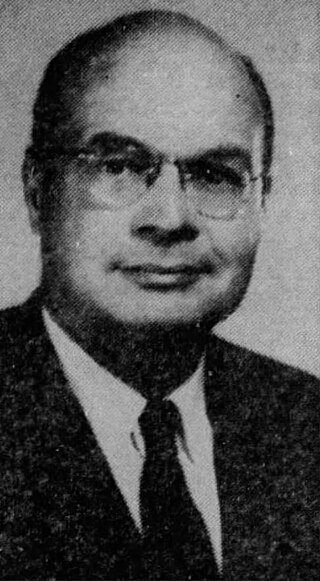
Ingolf Dahl was a German-born American composer, pianist, conductor, and educator.
Structural film was an avant-garde experimental film movement prominent in the United States in the 1960s. A related movement developed in the United Kingdom in the 1970s.
"Aladdin Sane (1913–1938–197?)" is a song by the English singer-songwriter David Bowie, the title track from his 1973 album Aladdin Sane. Described by biographer David Buckley as the album's "pivotal" song, it saw Bowie moving into more experimental musical styles following the success of his breakthrough glam rock release The Rise and Fall of Ziggy Stardust and the Spiders from Mars in 1972.
Barry Miles is an English author known for his participation in and writing on the subjects of the 1960s London underground and counterculture. He is the author of numerous books and his work has also regularly appeared in leftist newspapers such as The Guardian. In the 1960s, he was co-owner of the Indica Gallery and helped start the independent newspaper International Times.
Art pop is a loosely defined style of pop music influenced by art theories as well as ideas from other art mediums, such as fashion, fine art, cinema, and avant-garde literature. The genre draws on pop art's integration of high and low culture, and emphasizes signs, style, and gesture over personal expression. Art pop musicians may deviate from traditional pop audiences and rock music conventions, instead exploring postmodern approaches and ideas such as pop's status as commercial art, notions of artifice and the self, and questions of historical authenticity.
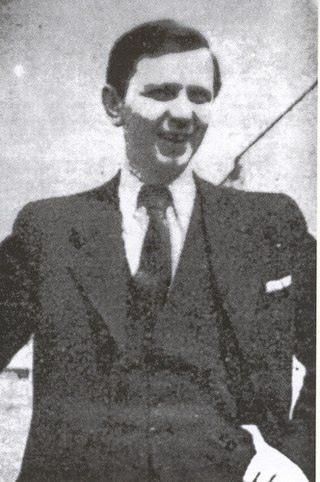
Dragan Aleksić was a Serbian Dadaist poet, author, journalist and filmmaker. He was the founder of the Yugoslavian branch of Dadaism, termed "Yugo-Dada".
Experimental rock, also called avant-rock, is a subgenre of rock music that pushes the boundaries of common composition and performance technique or which experiments with the basic elements of the genre. Artists aim to liberate and innovate, with some of the genre's distinguishing characteristics being improvisational performances, avant-garde influences, odd instrumentation, opaque lyrics, unorthodox structures and rhythms, and an underlying rejection of commercial aspirations.

It's All Right! is an album by the saxophonist Teddy Edwards which was recorded in 1967 and released on the Prestige label.
Nomad was an avant-garde literary magazine edited and published in Los Angeles between 1959 and 1962 by Anthony Linick and Donald Factor. Linick and Factor were particularly drawn to the poetry and writing of the Beat Generation, who wrote of their own, frequently chaotic, lives.
Steven Watson is an author, art and cultural historian, curator, and documentary filmmaker.
